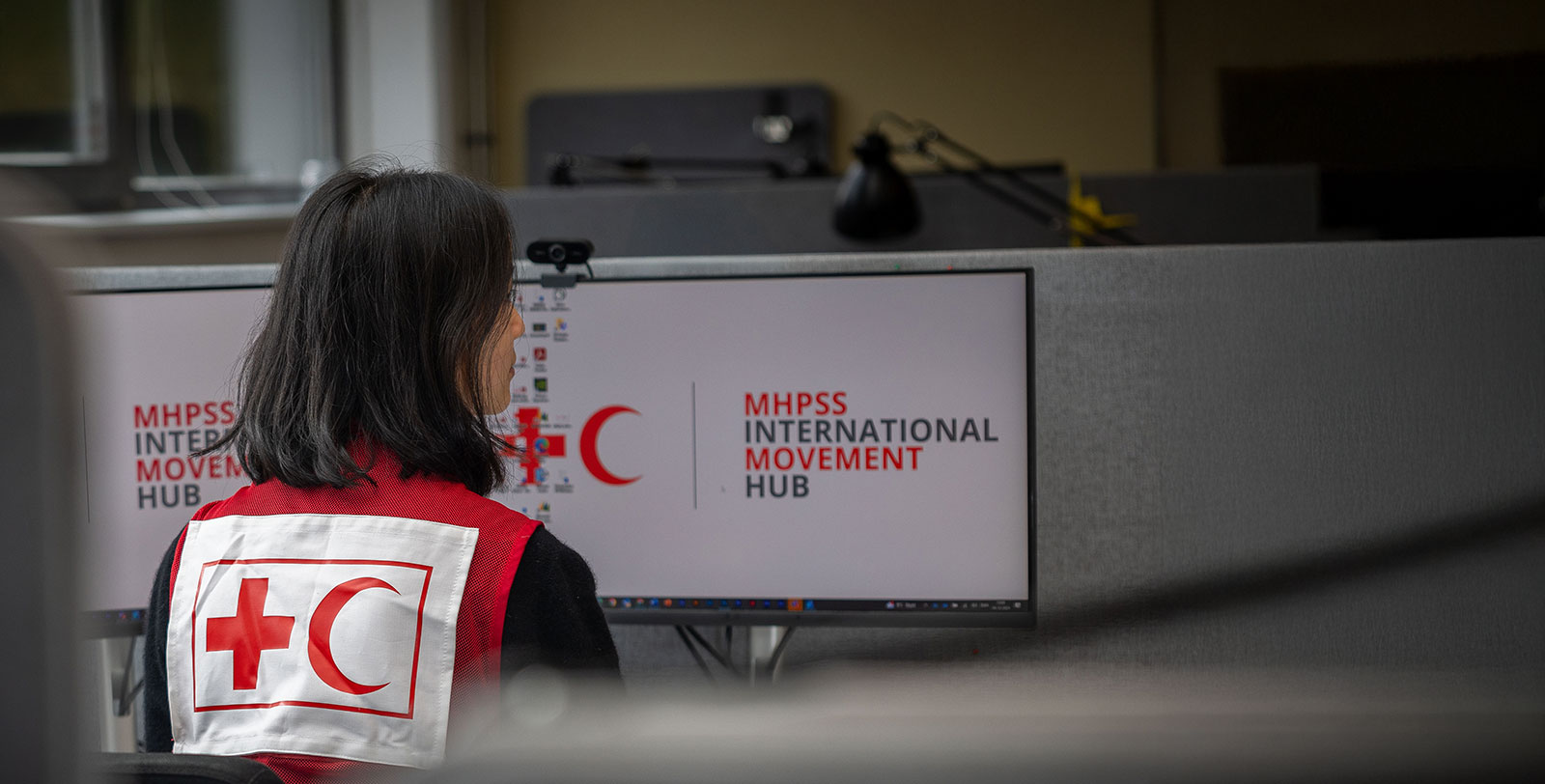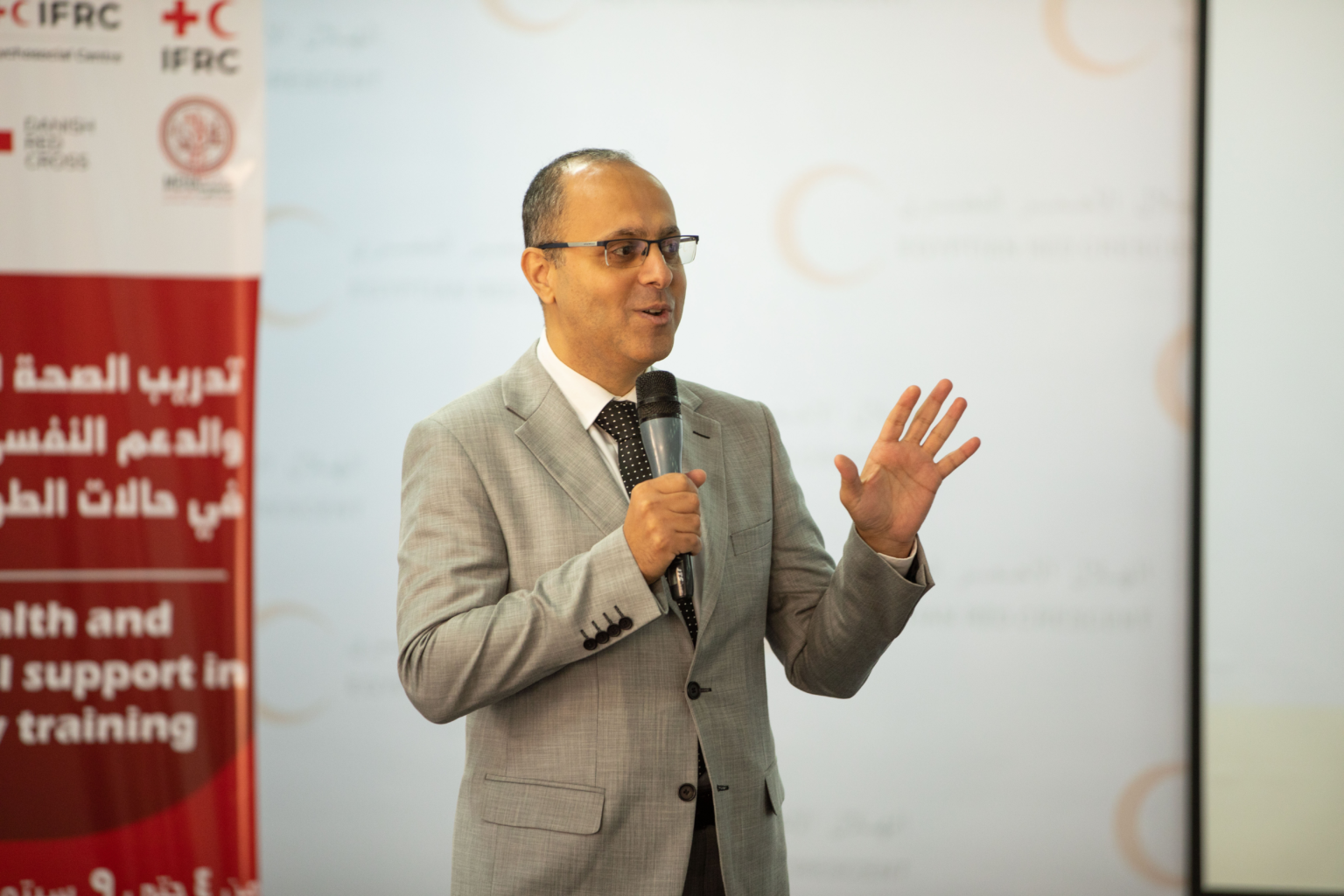Dr Haytham Qosa, Head of IFRC Regional Health and Care Unit for MENA, in the opening speech.
In September 2022, the IFRC MENA regional office in coordination with the IFRC Psychosocial Centre (PS Centre), Danish Red Cross, the MENA MHPSS network and ICRC offered an in-person training in mental health and psychosocial support (MHPSS) in emergencies. The six-day training took place in Cairo and was hosted by the Egyptian Red Crescent (ERC).
The training aimed to prepare participants for future deployment as MHPSS coordinators in Emergencies as part of the IFRC global Rapid Response System. 18 MHPSS experts from 12 National Societies took part in the training – a training it took almost a year to prepare.
Mahmoud Mohamed, Senior MHPSS officer for the IFRC MENA regional Office: “The idea for the training developed in 2021 after the earthquake in Haiti when we were unable to find candidates for positions as MHPSS coordinators with the right competencies for the surge. We started discussing if we could develop a program giving MHPSS Coordinators the right skills to be part of the first deployment of an emergency.”
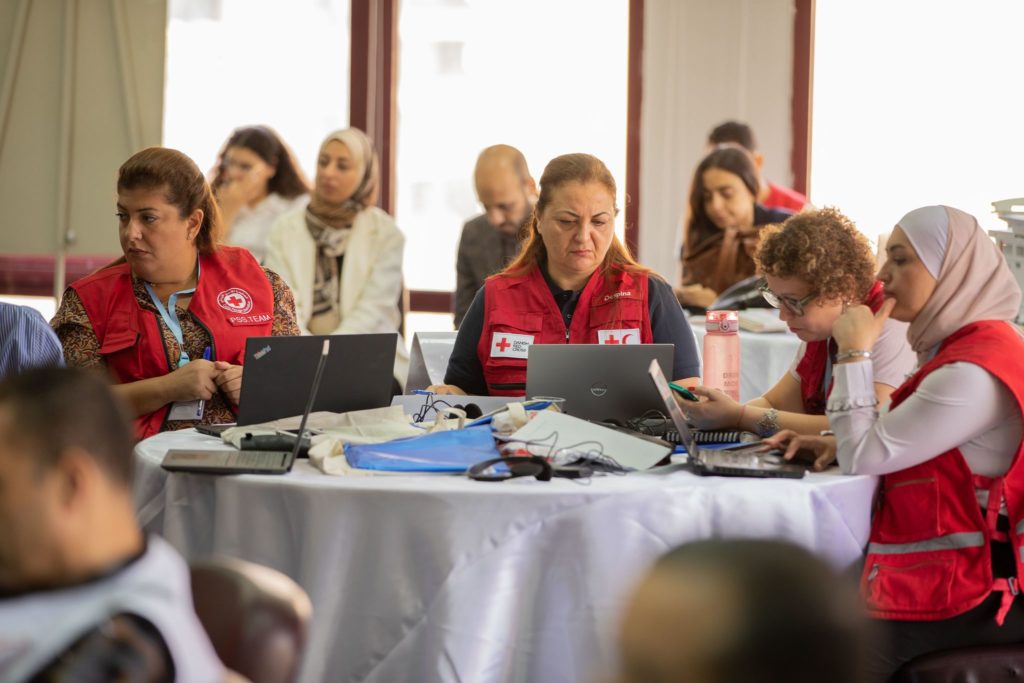
Ahlem Cheffi, Technical advisor for the PS Centre: “We wanted to create a training that was cross cutting. For example, we didn’t want to train the participants in Psychological First Aid (PFA). The training would be for people with expert knowledge about MHPSS, so they already knew that. We wanted to train them in how to conduct a PFA within an emergency team and in an emergency context. We didn’t want to train people on how to do a referral, but how to do a proper referral in an inter-agency meeting and how they coordinate within and outside the Red Cross Red Crescent Movement. We didn’t want the training to be about what to do, but about how to do it.”
“Therefore, the Rapid Response Surge team was involved from the very beginning, reflecting on how we could create this kind of training, and it became a unique experience – also for us, the trainers. Although we all had previous emergency experiences, we didn’t have experience as surge people and integrating MHPSS components into an already well-functioning surge mechanism became an intellectual challenge as we had to change our mindset completely.”
The preparation went beyond rethinking the training curriculum. The process of selecting the right participants for the training was in itself a long process with many steps.
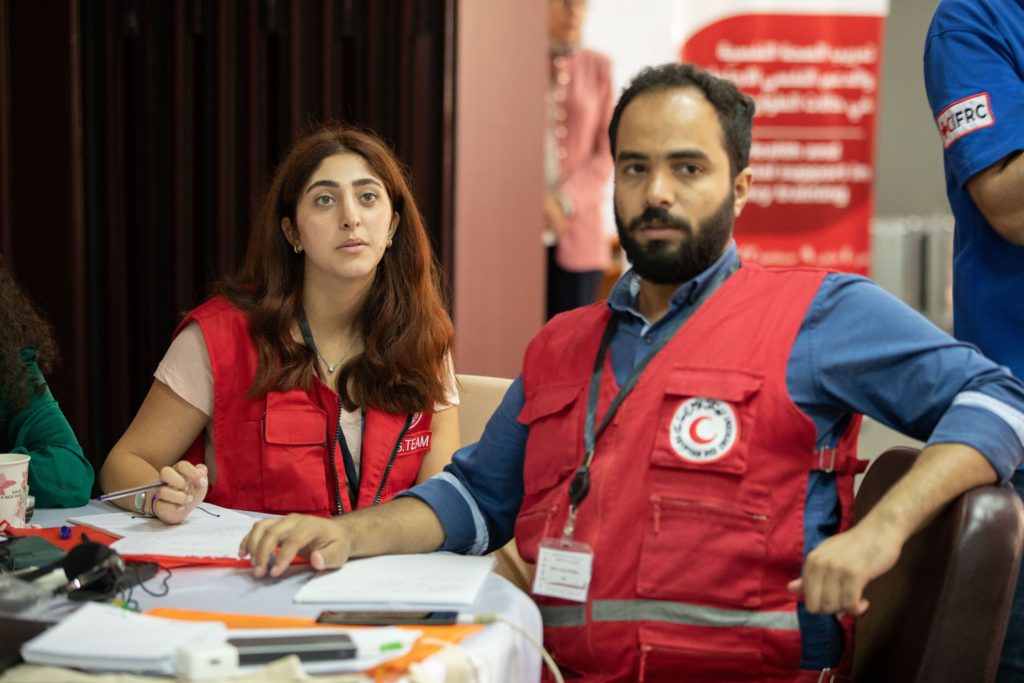
Ahlem: “With the assistance of IFRC Geneva, we developed a competency assessment along with a preparatory workshop in Lebanon, making it clear to the participants what was expected of them and what were the criteria for being selected for the training. Each participant had assignments they needed to share with us before being approved. Still, the group of participants ended up being very diverse.”
The training itself was based on a single scenario developed with the Rapid Response Surge team and this emergency scenario unfolded as the training progressed. Every day the participants would receive new information which they needed to act upon, new dilemmas they needed to consider. And every day after the training ended, the participants would spend an hour with a facilitator going through the day’s sessions and the choices they had made.
Ahlem: “We wanted to make the scenario as realistic as possible and show that things change constantly. To give an example, we had planned a two-hour exercise, but in the middle of it, the participants had to go to a meeting because of an evacuation. These incidents happened throughout the training as they do in reality and in this way, not just the knowledge of the participants was tested, but also their boundaries and their ability to adapt and find their place in a large emergency team.
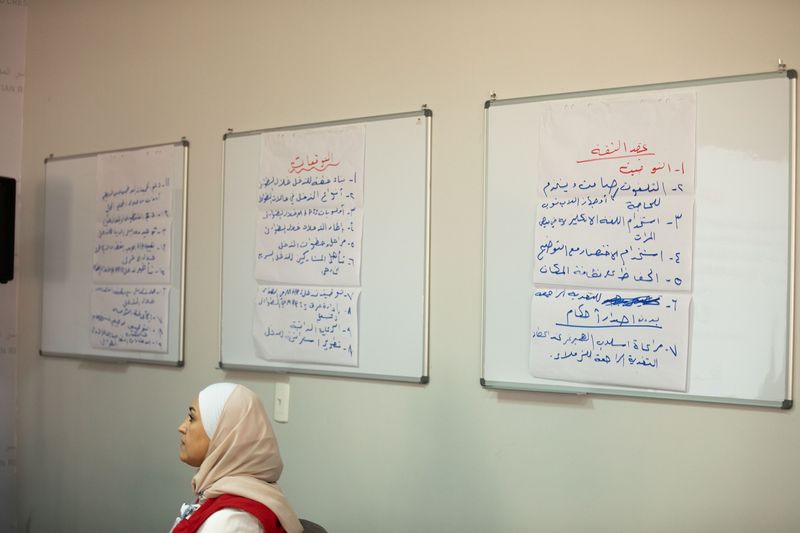
Mahmoud: “We chose to use one scenario through the whole training to make sure that participants would experience all aspects of an emergency, but it also gave us a very clear indication of, who was ready to be deployed and who needed more training. Who took initiative and who didn’t? Who were flexible enough to change strategy when the emergency scenario changed? There we so many different but necessary competencies that we needed to assess in every participant and the one-scenario approach gave us a comparable baseline for all. The daily evaluation of the participation of each individual was an important tool to assess their qualifications and their progress. By the end of the training, we felt that, within the larger group of participants, we had a pool of people ready to be deployed.”
Ahlem: “But it was also obvious, that the participants themselves also reflected on their ability and readiness for a deployment during the training. On the last day, they were given a space to share their reflections on the training and their experience and one of the topics being discussed was the importance of self-care. Throughout the training we introduced self-care exercises, but still, it is easy to forget, when taking care of others, that you also must take care of yourself and your own mental well-being, especially in a tense and complicated emergency context. I think that was an important lesson for many participants. ”
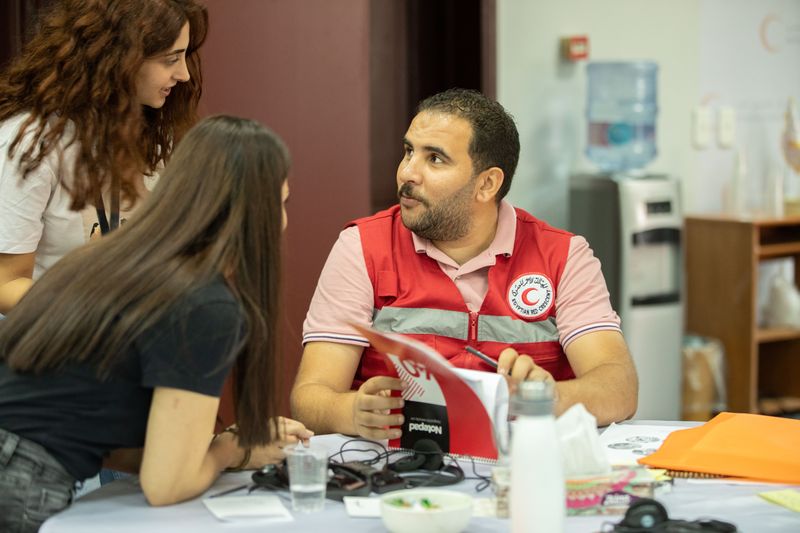
Mahmoud: “There was a lot of pressure, not just on the participants, but also on us, the trainers and facilitators. Adapting and developing a curriculum from scratch, bringing the different components of the Movement together was a big task, but also, I feel, an important task in the work to implement the Policy, Resolution and Roadmap.”
The next steps will be to further develop this new training curriculum, but also monitor the participants and whether they feel equipped to be deployed or if more training is required.
Ahlem: “One aspect of the training we should not forget, is the aspect of networking. Even if most participants and facilitators were from the MENA region, many of them had never met each other. But now we can see that they are communicating back and forth exchanging knowledge and experience. That creates an important feeling of cohesion.”
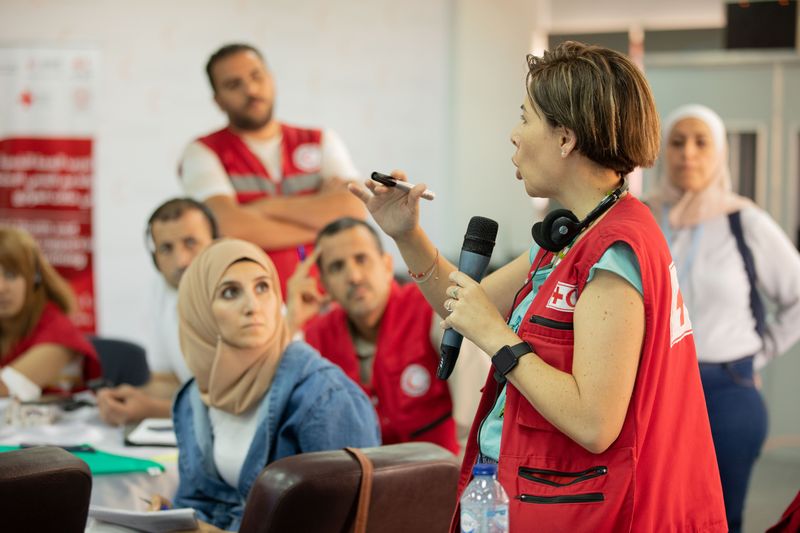
The MHPSS Emergency Surge Training in Cairo was just another step in the process of implementing the set of commitments addressing mental health and psychosocial needs at the 33rd International Conference of the Red Cross and Red Crescent Movement in December 2019. But an important one.
Photos: Gareen, Egypt Red Crescent Society
